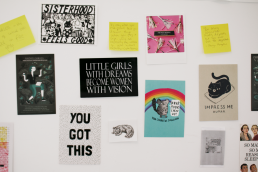By Dr Eve Hepburn and Cordelia Sampson
Art by Ida Henrich
Drum roll please…. After several months of incredibly hard work involving our staff, volunteers and over a thousand people filling out our surveys and polls, we’ve published our first research report!
The report is entitled ‘Fear of the Future? A Report on the Mental Health of Young Female and Non-Binary Students in the UK’ and you can read the report below or download it here.
What’s our report about? Well, as you’ll be aware, Fearless Femme is not just a mental health magazine and creative community. We’re also a hub for research exploring the main causes of stress among young female and non-binary people, with a particular focus on the student experience.
Over the past nine months, we’ve carried out nine surveys and over 20 polls on Twitter and Instagram asking YOU what is causing stress in your life, and how you would change university, college, workplace and government systems to create a more nurturing and caring environment for supporting the mental wellbeing of young adults.
We have been humbled to receive over 1000 responses to our surveys and polls, and you have not been shy in telling us what needs to change ?
We’ve discovered that 97% of Fearless Femme’s volunteer writers and artists have struggled with their mental health, compared to 95% of readers and followers. The most popular form of self-care used by our volunteer contributors to manage their mental health was – happily ? – “creative writing, artwork and photography”, showing that creative expression helps underpin wellbeing.
This report – which we hope will be the first of many – focussed in particular on the experience of young female and non-binary students and graduates of UK universities and colleges. We looked at various aspects of mental health and student life – including themes on starting university, surviving education and life after graduation – in addition to a broader theme on mental health policy.
Our main findings were that students are fearful of failure and of the future due to negative rhetoric, particularly around exams. Students feel like the mental health support services are often inadequate in schools, colleges and universities and would like to see more resources available around maintaining mental wellbeing while increasing long-term counselling capacity. We also found that the transition from education to work is particularly stressful, but that little support is provided.
We didn’t just want to focus on the ‘problems’ though; we also wanted YOU to tell us what you think the ‘solutions’ should be. And here, we were massively impressed by your clever, creative and thoughtful suggestions.
We’ve done our best to collate this rich feedback into a series of policy recommendations for university, college and government policymakers, and we’ve included a list of recommendations in our research report. These range from transforming the narrative around ‘failure’ at exam time, to building wellbeing into the curriculum from school-level upwards to university.
Finally, we wanted to find out about whether the existence of Fearless Femme – and the creative mental health project we’ve launched – has had any impact on our community at large. Here, we were humbled to discover that 90% of our volunteer writers and artists felt that contributing their work to Fearless Femme has had as positive impact on their mental health, while 83% of our readers felt that being part of the Fearless Femme community made them feel better.
In particular, large numbers of our volunteer writers and artists felt that ‘helping other people’ (by sharing their mental health stories) made them ‘feel better’ – proving the wellbeing benefits of volunteering!
So a massive thank you to everyone who has helped us with our research programme! We hope that you enjoy reading the report – which has been lovingly put together by the whole Fearless Femme team – and if you have the time, why not send a copy to your university or college? We’ll be distributing the report to organisations across the UK over the next few weeks, and we sincerely hope that these recommendations – your recommendations – are taken seriously. Because young people deserve the right to enjoy the benefits of education fearlessly.






